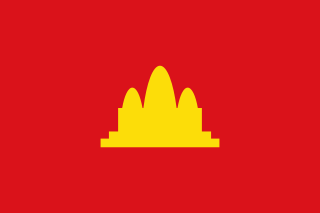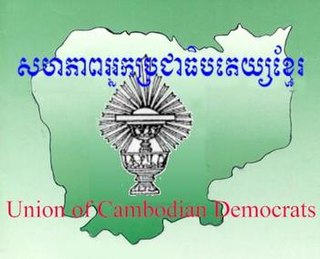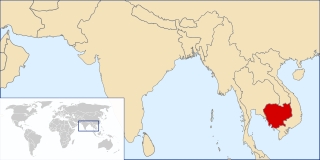After the fall of the Pol Pot regime of Democratic Kampuchea, Cambodia was under Vietnamese occupation and a pro-Hanoi government, the People's Republic of Kampuchea, was established. A civil war raged during the 1980s opposing the government's Kampuchean People's Revolutionary Armed Forces against the Coalition Government of Democratic Kampuchea, a government in exile composed of three Cambodian political factions: Prince Norodom Sihanouk's FUNCINPEC party, the Party of Democratic Kampuchea and the Khmer People's National Liberation Front (KPNLF).

The Candlelight Party is a liberal party in Cambodia. The party was a member of the Council of Asian Liberals and Democrats, Liberal International, and the Alliance of Democrats. It is the largest opposition party in Cambodia, and the main challenger to the ruling Cambodian People's Party. The party resumed political activity in October 2021 after being inactive since 2012.

Son Sen, alias Comrade Khieu (សមមិត្តខៀវ) or "Brother Number 89", was a Cambodian Communist politician and soldier. A member of the Central Committee of the Communist Party of Kampuchea/Party of Democratic Kampuchea, the Khmer Rouge, from 1974 to 1992, Sen oversaw the Party's security apparatus, including the Santebal secret police and the notorious security prison S-21 at Tuol Sleng.

The Cambodian–Vietnamese War, known in Vietnam as the Counter-offensive on the Southwestern border, and by Cambodian nationalists as the Vietnamese invasion of Cambodia, was an armed conflict between Democratic Kampuchea, controlled by the Khmer Rouge, and the Socialist Republic of Vietnam. The war began with repeated attacks by the Liberation Army of Kampuchea on the southwestern border of Vietnam, particularly the Ba Chuc massacre which resulted in the deaths of over 3,000 Vietnamese civilians. On 25 December 1978, Vietnam launched a full-scale invasion of Kampuchea, and subsequently occupied the country and removed the government of the Communist Party of Kampuchea from power.

The Khmer People's National Liberation Front was a political front organized in 1979 in opposition to the Vietnamese-installed People's Republic of Kampuchea (PRK) regime in Cambodia. The 200,000 Vietnamese troops supporting the PRK, as well as Khmer Rouge defectors, had ousted the Democratic Kampuchea regime of Pol Pot, and were initially welcomed by the majority of Cambodians as liberators. Some Khmer, though, recalled the two countries' historical rivalry and feared that the Vietnamese would attempt to subjugate the country, and began to oppose their military presence. Members of the KPNLF supported this view.
The Buddhist Liberal Democratic Party (BLDP) was a Cambodian political party founded in 1993 by former Cambodian Prime Minister Son Sann. The BLDP was created as a successor to the Khmer People's National Liberation Front (KPNLF), an anti-communist group also started by Son Sann.

The Coalition Government of Democratic Kampuchea, renamed in 1990 to the National Government of Cambodia, was a coalition government in exile composed of three Cambodian political factions, namely Prince Norodom Sihanouk's FUNCINPEC party, the Party of Democratic Kampuchea and the Khmer People's National Liberation Front (KPNLF) formed in 1982, broadening the de facto deposed Democratic Kampuchea regime. For most of its existence, it was the internationally recognized government of Cambodia.
Son Sann was a Cambodian politician and anti-communist resistance leader who served as the 22nd Prime Minister of Cambodia (1967–68) and later as President of the National Assembly (1993). A devout Buddhist, he was married and fathered seven children. His full honorary title is "Samdech Borvor Setha Thipadei Son Sann".

The People's Republic of Kampuchea (PRK) was a partially recognised state in Southeast Asia supported by Vietnam which existed from 1979 to 1989. It was founded in Cambodia by the Kampuchean United Front for National Salvation, a group of Cambodian communists who were dissatisfied with the Khmer Rouge due to its oppressive rule of Cambodia and defected from it after the overthrow of Democratic Kampuchea, Pol Pot's government. Brought about by an invasion from Vietnam, which routed the Khmer Rouge armies, it had Vietnam and the Soviet Union as its main allies.

The Union of Cambodian Democrats was a political alliance in Cambodia, which was formed by three political parties, one of them being the Khmer Nation Party of Sam Rainsy, Prince Norodom Ranariddh was involved as well. These three political parties called their umbrella group the "Union of Cambodian Democrats". It was created in exile in 1997 after a coup d'etat. The leaders of three political parties which united their leadership and political parties together to create the Union of Cambodian Democrats were Sam Rainsy's Sam Rainsy Party, Son Sann's Buddhist Liberal Democratic Party and also prince Norodom Ranariddh's FUNCINPEC party. However, from the late 1990s onwards a new political party, the Bou Hel and Ty Chhin's Khmer Neutral Party, became part of the alliance.

The Khmer People's National Liberation Armed Forces (KPNLAF) was the military component of the Khmer People's National Liberation Front (KPNLF) a political front organized in 1979 in opposition to the Vietnamese-installed People's Republic of Kampuchea (PRK) regime in Cambodia. The KPNLAF was loyal to Son Sann, a former Prime Minister under Prince Norodom Sihanouk and the founder of the KPNLF political movement.

The 1997 Cambodian coup d'état took place in Cambodia in July to September 1997. As a result, co-premier Hun Sen ousted the other co-premier Norodom Ranariddh. At least 32 people were killed during the conflict.
Cheng Heng was a Cambodian politician, who was the country's Head of State from 1970–1972, and was a relatively prominent political figure during the Khmer Republic period (1970–1975).
General Sak Sutsakhan was a Cambodian politician and soldier who had a long career in the country's politics. He was the last Head of State of the Khmer Republic, the regime overthrown by the Khmer Rouge in 1975. Sak Sutsakhan formed a pro-US force known as the Khmer Sâ. As a businessman, Sak Susakhan notably owned a Dairy Queen franchise in Anaheim, California.
The Democratic Party, commonly referred to as The Democrats, was a left-wing pro-independence political party formed in 1946 by Prince Sisowath Youtevong, who had previously been a member of the French Section of the Workers' International. It was the sole dominant party in Cambodia from 1946 until the creation of Sangkum in 1955.

General Dien Del was a prominent Cambodian military officer and later, politician. He directed combat operations in Cambodia, first as a general in the Army of the Khmer Republic (1970–1975) and then as a leader of Khmer People's National Liberation Front (KPNLF) guerrilla forces fighting against the Vietnamese occupation (1979–1992). Following Vietnam's withdrawal from Cambodia in 1990, he presided over the demobilization of the KPNLF's armed forces in February 1992. In 1998 he was elected to the National Legislative Assembly as a member of FUNCINPEC. He spent the last fifteen years of his career as advisor to the Cambodian government.

United Nations Security Council resolution 668, adopted unanimously on 20 September 1990, after noting the ongoing political discussions and efforts regarding a just and lasting peaceful situation in Cambodia, the council endorsed the political framework that would enable the Cambodian people to exercise their right to self-determination through U.N. organised elections.
The Cambodian Constituent Assembly was a body elected in 1993 to draft a constitution for Cambodia as provided in the 1991 Paris Peace Agreements. The writing of the Cambodian Constitution took place between June and September 1993 and it resulted in the transformation of the political situation of Cambodia from civil-war-marred, autocratic oligarchy to a constitutional monarchy. Achieved under the guidance, auspices and funding of the United Nations Transitional Authority in Cambodia (UNTAC), the drafting of the constitution was the culmination of a larger, $1.6 billion effort to end the decades-old country’s civil wars and bring the warring parties into political, rather than military competition. The result of the process was the creation of a constitution for Cambodia that, at least on paper, guarantees free political competition, regular elections, equal rights and representation and universal suffrage.
Heng Vong Bunchhat is a Cambodian lawyer, who is a Senior Adviser to the Government most famous for setting up the Khmer Rouge Tribunal. He was the candidate nominated by the Royal Government of Cambodia for election to the International Criminal Court in 2003. He is considered as the father of the Constitution of Cambodia, having drafted both the republican Constitution of 1974 and the royalist Constitution of 1993.
Son Soubert is a Cambodian politician, adviser to King Norodom Sihamoni and former member of the Constitutional Council of Cambodia.












